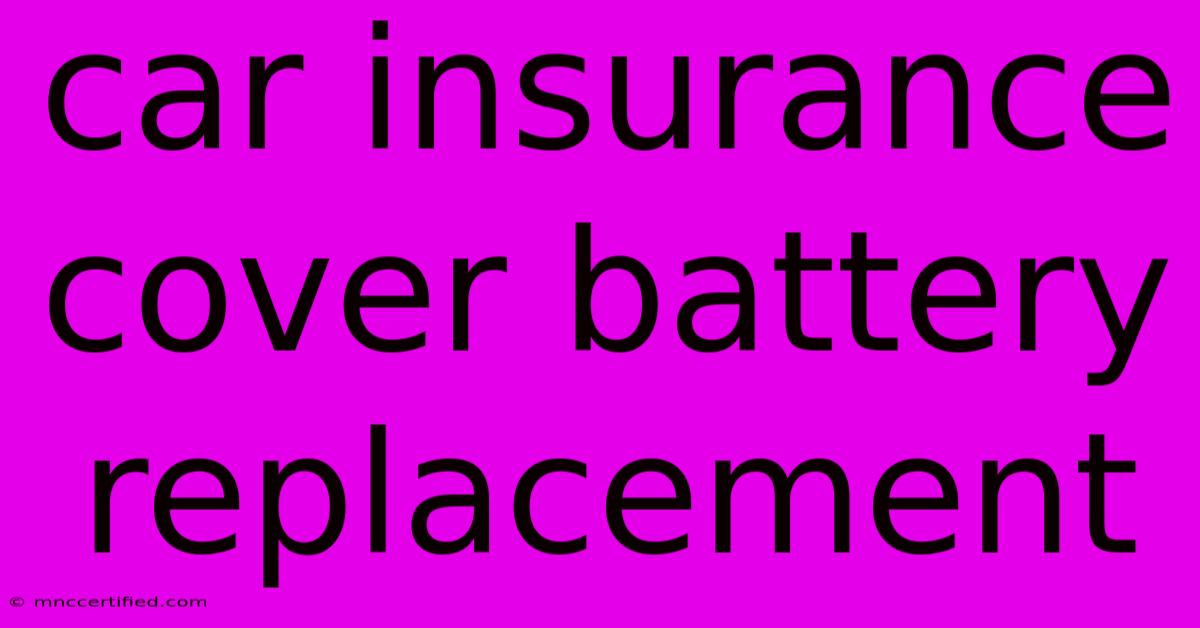Car Insurance Cover Battery Replacement

Table of Contents
Does Car Insurance Cover Battery Replacement? A Comprehensive Guide
Car batteries are essential for your vehicle's operation, and when they die, it can be a frustrating and costly inconvenience. You might wonder if your car insurance policy covers battery replacement. The answer, unfortunately, isn't a simple yes or no. It depends on several factors, including:
1. The Cause of the Battery Failure:
- Natural Wear and Tear: Most car insurance policies do not cover battery replacement due to normal wear and tear. Batteries have a limited lifespan, and eventually, they will need to be replaced.
- Covered Events: Your policy might cover battery replacement if the failure was caused by a covered event, such as:
- Accident: If your car was in an accident and the battery was damaged, your insurance might cover the replacement.
- Theft: If your car was stolen and the battery was damaged or removed, your insurance could cover the cost.
- Natural Disaster: If your battery was damaged due to a flood, fire, or other natural disaster, your policy might provide coverage.
2. Your Specific Policy:
- Comprehensive Coverage: Some policies include comprehensive coverage, which protects your vehicle against damage from non-collision events, such as theft, vandalism, or natural disasters. This type of coverage might cover battery replacement if the failure was due to a covered event.
- Collision Coverage: This coverage protects your vehicle against damage caused by a collision. It typically does not cover battery replacement, even if the battery was damaged in an accident.
3. Deductible:
- Even if your policy covers battery replacement, you will likely have to pay a deductible, which is a set amount you pay before your insurance covers the rest of the costs.
How to Determine Coverage:
The best way to know whether your car insurance policy covers battery replacement is to review your policy documents or contact your insurance agent. Be sure to ask specifically about coverage for battery replacement and any relevant deductibles.
Tips for Maintaining Your Car Battery:
While car insurance might not cover battery replacement due to natural wear and tear, you can take steps to extend its lifespan:
- Regular Maintenance: Get your battery checked during regular car maintenance appointments.
- Keep it Clean: Clean your battery terminals regularly to prevent corrosion.
- Check Fluid Levels: Ensure the battery has enough electrolyte fluid.
- Avoid Extreme Temperatures: Heat and cold can damage batteries.
- Drive Regularly: Driving your car frequently helps keep the battery charged.
Alternatives to Insurance Coverage:
If your car insurance doesn't cover battery replacement, you have several options:
- Warranty: Check if your car battery has a warranty. Some batteries have a limited warranty that covers replacement.
- Roadside Assistance: Consider subscribing to a roadside assistance service, which might offer battery replacement or jump-start assistance.
- Auto Shop: Many auto repair shops offer affordable battery replacement services.
In Conclusion:
While car insurance might not cover battery replacement due to normal wear and tear, it might cover replacement if the battery fails due to a covered event. Review your policy documents or contact your agent to determine your specific coverage. Remember, proactive battery maintenance can help you avoid costly replacements in the future.

Thank you for visiting our website wich cover about Car Insurance Cover Battery Replacement. We hope the information provided has been useful to you. Feel free to contact us if you have any questions or need further assistance. See you next time and dont miss to bookmark.
Featured Posts
-
Galatasaray Vs Tottenham Tv Kick Off Time
Nov 08, 2024
-
New Starbucks Holiday Drinks And Pastries Now Available
Nov 08, 2024
-
Failure To Provide Proof Of Insurance Nj
Nov 08, 2024
-
Bidens Address Unity And Faith Plea
Nov 08, 2024
-
Rescue Planes Sent After Football Fans Attacked
Nov 08, 2024